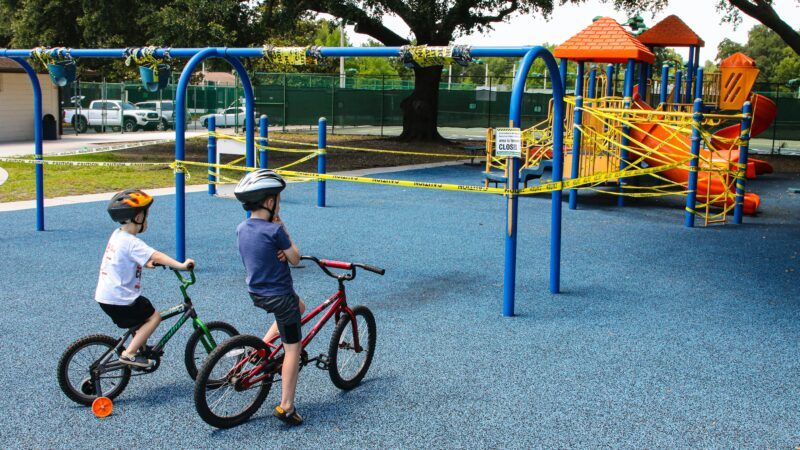Arizona Mom Threatened With Prison, Placed on Secret Blacklist For Letting Kids Play At the Park
"The market was asking that anyone who didn't need to go into the store to please stay outside," she says.

It was a little more than a year ago—right before Thanksgiving, as COVID-19 raged—that Jessica committed her crime: She let her 7-year-old son and his friend, age 5, play at the park while she went to buy a turkey.
For this, she faced criminal charges, as well as being listed for 25 years on Arizona's Central Registry, a secret blacklist that functions similarly to the sex offender registry but is less publicly accessible.
What, exactly, transpired that day?
Due to the pandemic, the kids weren't keen to go into the grocery store and Jessica wasn't that keen to let them. "The market was asking that anyone who didn't need to go into the store to please stay outside," she says. (To protect her identity, this article uses the pseudonym "Jessica." Reason reviewed documents, including police reports, that verified her story.)
Instead, she dropped the kids off at a park five blocks from the grocery—a park she had played in as a girl. At the time of the drop-off, a friend of hers was teaching a tai chi class at the park and another acquaintance was there walking her dog. Jessica told the boys not to leave the play area and dashed off to get the turkey.
While she was at the store, the tai chi teacher ran in to tell Jessica that the cops were talking to her kids. The two women raced back to the park, where the cops told her that she had broken the law.
In fact, the police made a startling assertion, Jessica later recounted: "One of the police officers told me that children of any age, up to 18, must be with a guardian at all times in a public place."
While that is clearly not the case, eventually she was criminally charged with two counts of contributing to the delinquency of a child. Each count carried a potential for six months' jail time. This means that as punishment for ostensibly not supervising her child closely enough for a short time, the state was threatening to stop Jessica from supervising her child at all, for a year.
Jessica hired a lawyer. He explained that the consequences of possibly losing at trial dwarfed the punishment for pleading guilty: In exchange for successfully completing a parenting class, the criminal case would be dismissed.
Jessica took the plea and enrolled in the class. The class had nothing to do with parenting, and people were there for very different reasons, including one who'd shaken her phone at a cop and another who had pulled someone's hair at a salon.
"Everyone is here today because you don't know how to deal with the police," she recalls the teacher saying. He then instructed them on how to keep calm and defuse situations.
Once she passed the class, the criminal charges against her were dismissed and vacated. But that was not the end of things, because Arizona's Department of Child Safety (DCS) was conducting a separate investigation.
In a letter they sent seven months after the incident, DCS declared that Jessica had placed her son "at unreasonable risk of harm for abduction, injury, harm from a stranger, exposure to drugs and death."
Jessica searched the archives for any story of an abduction or murder at the park and could find none. Nonetheless, her name was to be entered into the Central Registry for child abusers. There it will stay for 25 years unless the verdict is overturned at a hearing she requested. The hearing is set for early next year. In the meantime, being on that list means Jessica can't work directly with kids, and could possibly even be prevented from volunteering at her son's school.
According to Diane Redleaf, author of They Took the Kids Last Night: How the Child Protection System Puts Families at Risk, and legal consultant to Let Grow, not only are stories like Jessica's too common throughout America, 25-year registers are the norm in many states. Moreover, guilty findings are commonly issued by caseworkers—that is, without a trial—and hearings to contest those findings are often delayed.
Just last year, for example, New York cut its register length from 25 years down to eight years, which is still far too long for a parent who has done nothing more than buy a turkey while her child played happily in the park.
"Vague child neglect laws—open to the interpretation of any cop or caseworker—set up parents for no-win parenting choices," says Redleaf. "Without clearer laws that limit neglect to a serious likelihood of harm, registers will continue to sweep in thoughtful, loving, and protective parents."
Put another way: Real child neglect is when you actually neglect your kids, not when you let them play outside at a park during a pandemic while you run to the store.


Show Comments (59)